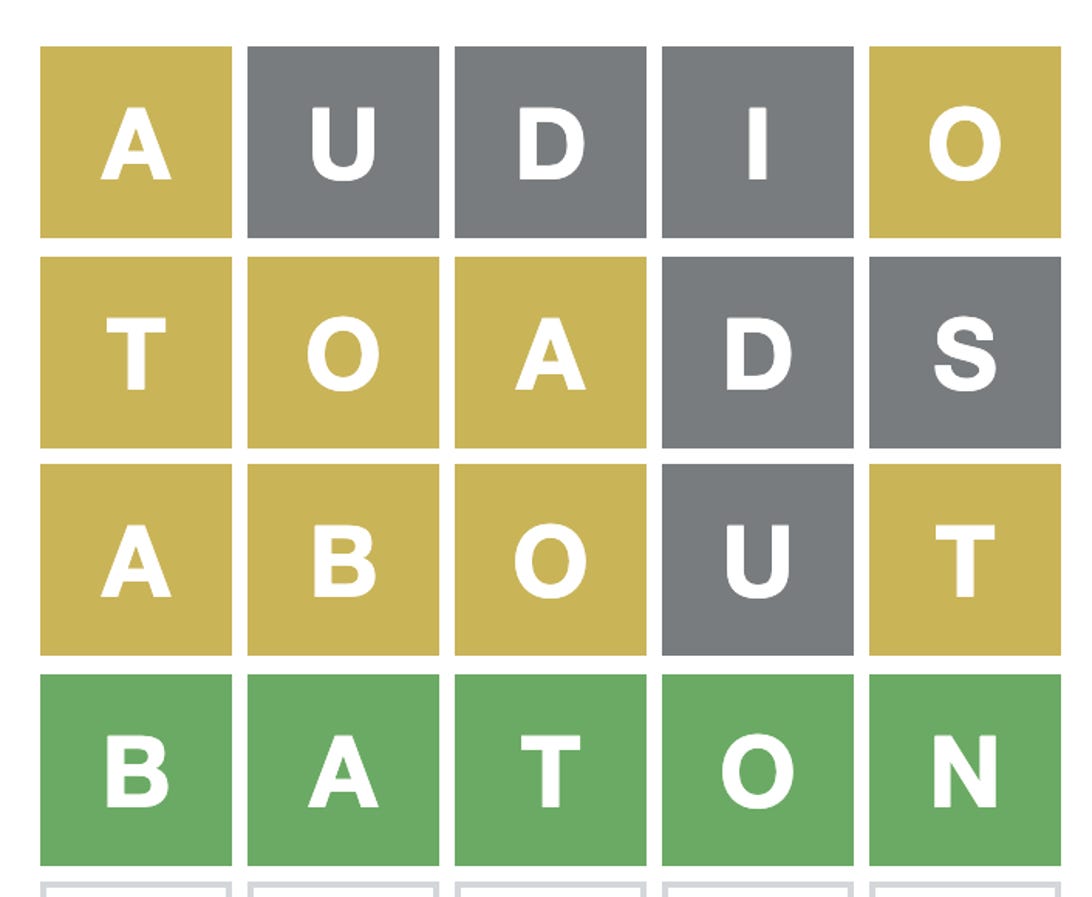
If you’re anything like me, your day starts with an empty grid on your phone’s screen. Those tiny squares are waiting to be filled with guesses at the correct five-letter word, a mystery I usually crack by the fourth or fifth try.
I’m talking about Wordle, the daily online word puzzle that’s seemingly dominated the internet’s attention over the last two months. It’s especially popular on Twitter, which has become the social platform of choice for players to share their results. As of early January, more than 300,000 people had played the game, according to The New York Times.
I’ve been thinking about what makes Wordle so special, and for me it boils down to two characteristics. For one, you can only play once per day, so there are limits around how often you can participate. This builds anticipation and makes Wordle something to look forward to, which is refreshing since I’m used to binging most of my favorite games. Plus, everyone is playing the same puzzle each day, and broadcasting how they did, so there’s a sense of community.
Wordle isn’t the first game to thrive on the appeal of once-per-day gameplay and shared experiences, and word puzzles existed long before the internet. But Wordle brings back a very specific feeling, one I haven’t encountered since the HQ Trivia boom back in 2017 and 2018.
Yes I understand they’re two very different games with decidedly different approaches to gameplay. As their respective titles suggest, Wordle is a word puzzle and HQ Trivia is a trivia game show. You can play Wordle any time you wish, but there’s only one puzzle per day. HQ Trivia, on the other hand, is an app-based quiz show that happens on a specific schedule, meaning you can only participate in the main game when shows are being broadcast. (The current HQ Trivia app now has “daily challenges” that can be played anytime).
Despite their obvious differences, both games have resonated strongly with me for similar reasons. Wordle has become an anticipated daily ritual, much like HQ Trivia was years ago. During the quiz show’s peak, I would regularly log into the evening game alongside hundreds of thousands of players from all over the world. I never actually won HQ Trivia, but I shared a collective dopamine hit with my fellow players as I got closer to the end (things really got tricky around the eighth question).
Wordle is bringing back some of those feelings, albeit in a different way. I get that same sense of communal satisfaction when I see my Twitter feed filled with tiny grids of black, yellow and green squares after completing my morning puzzle. And when there’s a particularly difficult Wordle, as was the case on Monday, there’s a shared sense of victory or defeat. The two games are inherently different, but they’ve both managed to draw me back around the same time every day — not something I can say for most of the games or apps on my phone.
There is also no shortage of Wordle clones easily available for anyone who needs more puzzles, which isn’t surprising given the game’s simplicity and popularity. HQ Trivia clones were also all over the place during the trivia app’s moment in the spotlight.
Based on what I’ve observed anecdotally, I’m not the only one who has built new routines around Wordle. People seem to be using Wordle as a means to bond with their co-workers virtually. This reminds me of the days when HQ Trivia doubled as the office watercooler several years ago.
My wordle network is growing. I have 2 group chats, have successfully converted a dozen coworkers, in no time, there won’t be a person I know who isn’t wordleing
— laura (@bookiesncookies) January 27, 2022
My coworkers & I have been sharing our Wordle results in a Slack channel, so I decided to make some stats.
Wordle 220:
30 results posted
1: 🟩 [3%] 🤯
2: 🟩 [3%] 😮
3: 🟩🟩🟩🟩🟩🟩🟩🟩🟩🟩🟩🟩🟩🟩🟩 [50%]
4: 🟩🟩🟩🟩🟩🟩 [20%]
5: 🟩🟩🟩🟩🟩 [17%]
6: 🟩🟩 [7%]
X: [0%]— Tim Ellis, 🗿 guy (@The_Tim) January 26, 2022
But HQ Trivia’s fame was short-lived. The app still exists and shows are hosted every Thursday at 9 p.m. E.T. according to its Twitter page, which was last updated on Jan. 6. But it hasn’t managed to generate the same buzz as it did in its heyday. HQ Trivia, which is operated by Intermedia Labs, was also on the brink of shutting down in February 2020 when an acquisition deal fell through and the company’s lead investors pulled their funding. The app was revived less than two months later, but original host Scott Rogowsky — who was the face of HQ Trivia — left in 2019.
Who knows whether Wordle will burn out, but it has a few factors working in its favor. For one, Wordle wasn’t meant to be a business even though it just sold to the New York Times. Wordle is a simple game that Josh Wardle, a Brooklyn-based software engineer, created for his word-game-loving partner, as The New York Times reported. It just happened to become immensely popular. The overall Wordle experience is also simpler than that of most games, including HQ Trivia. There’s no need to create a profile, link a social media account or even download an app to play.
The creators behind HQ Trivia, on the other hand, had broader ambitions to build a new type of media company. The HQ Trivia office felt like a combination of a tech startup and a mini-TV studio complete with writers, makeup artists and other staff, as I wrote for Time in 2018.
I don’t know if Wordle will be a permanent fixture on my phone, or if I’ll similarly be reflecting on its moment in the sun several years later. But I’m certainly enjoying its 15 minutes of fame for now.

